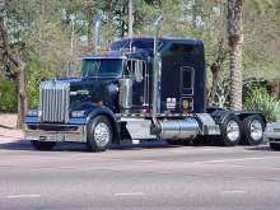What Companies Hire With No Experience And Didnt Go To A Roadmaster Or Other Driving Schools
Topic 3508 | Page 2

I know about 7 people that have went to roadmaster and few other schools and they all said that the only thing they teach you how to shift, back up, and parallel park, and of course the pre-trip
I can tell you this much that's what most schools do. The school I went to cane right out and said the first day "we are here to help you get your license. Everything else you will learn on the job". I think they do this for two reasons. First is there is just way too much about the industry for then to possibly cover in the short amount of time they get. Second is to let the companies teach their employees how they like things done and how it should be done. I.e. strapping loads, sliding tandoms, etc. They just want to give you the basics to get started. Hope this helps
Ditto with what Heavy C said. My school was the same way and the companies that hired us knew we didn't know everything about the industry. That being said, they will give you what you need to get started. The rest is up to what the company wants you to do.
Dm:
Dispatcher, Fleet Manager, Driver Manager
The primary person a driver communicates with at his/her company. A dispatcher can play many roles, depending on the company's structure. Dispatchers may assign freight, file requests for home time, relay messages between the driver and management, inform customer service of any delays, change appointment times, and report information to the load planners.Indeed I agree with the guys 100% - you'll want to go to a legitimate school.
Listen, I'm self-taught at numerous things. In fact, I'm a self-taught computer programmer. I prefer to learn things on my own instead of a classroom setting. But there's one big problem with that - most people won't employ someone who is self-taught. I've never worked for anyone as a computer programmer...I work for myself. I also taught myself professional tree climbing as the owner of my own tree service a few years back. But again, I never went to work for anyone else doing that.
Truck driving, welding, and Harley Davidson mechanics are all things I went to school for because I wanted to have careers in those trades and employers needed to see that I attended a legitimate school.
Remember, most successful people think long term and they try to do things the right way the first time. There is a time and place to try shaving off steps and cutting corners, but the training you get for a new career driving an 80,000 pound building on wheels is not the time or the place to do it.
HOS:
Hours Of Service
HOS refers to the logbook hours of service regulations.New Reply:
New! Check out our help videos for a better understanding of our forum features

















Preview:








 TT On Facebook
TT On Facebook
The instructors at my school said that if they had to teach us everything we needed to know, the school would be a year long.
Dave
Dm:
Dispatcher, Fleet Manager, Driver Manager
The primary person a driver communicates with at his/her company. A dispatcher can play many roles, depending on the company's structure. Dispatchers may assign freight, file requests for home time, relay messages between the driver and management, inform customer service of any delays, change appointment times, and report information to the load planners.